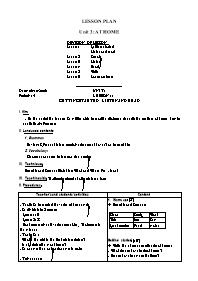Giáo án môn Tiếng Anh Lớp 8 - Unit 3: At home - Period 14, Lesson 1: Getting started + listen and read

UNIT:
Period: 14 LESSON 1:
GETTING STARTED + LISTEN AND READ
I. Aim
- By the end of the lesson, Ss will be able to read the dialogue, describe the routines at home, how to use Reflexive Pronouns
II. Language contents:
1. Grammar:
Review: S.Present, future, modal verbs: must, have / has to, ought to
2. Vocabulary:
Steamer, saucepan, frying pan, rice cooker
III. Techniques:
Noughts and Crosses, Matching, What and Where, Pre - teach
IV. Teaching aids: Textbook, colored chalks, pictures, tape
Bạn đang xem tài liệu "Giáo án môn Tiếng Anh Lớp 8 - Unit 3: At home - Period 14, Lesson 1: Getting started + listen and read", để tải tài liệu gốc về máy bạn click vào nút DOWNLOAD ở trên
LESSON PLAN Unit 3: AT HOME DEVISION OF LESSON Lesson 1 Getting started Listen and read Lesson 2 Speak Lesson 3 Listen Lesson 4 Read Lesson 5 Write Lesson 6 Language focus *********************** Date: 06/10/2006 UNIT: Period: 14 LESSON 1: GETTING STARTED + LISTEN AND READ I. Aim - By the end of the lesson, Ss will be able to read the dialogue, describe the routines at home, how to use Reflexive Pronouns II. Language contents: 1. Grammar: Review: S.Present, future, modal verbs: must, have / has to, ought to 2. Vocabulary: Steamer, saucepan, frying pan, rice cooker III. Techniques: Noughts and Crosses, Matching, What and Where, Pre - teach IV. Teaching aids: Textbook, colored chalks, pictures, tape V. Procedures: Teacher’s and students’ activities Content - T calls Ss to remind the verbs of housework - Ss divide into 2 groups Group 1: 0 Group 2: X Each group gives 3 verbs correct -try. That group is the winner - T asks Ss : What is the girl in the first picture doing? Is she doing the washing up? - Ss answer then ask and answer in pairs - T gives cues: 1. Doïn deïp 2. Cho gaø aên 3. Naáu nöôùng 4. Queùt nhaø 5. Röûa baùt ñóa 6. Gaáp chaên maøn - Ss match - T asks to write a passage about the chores you often do at home by using pictures as prompts - Ss work individually - T goes around and helps Ss if necessary - T asks Ss to compare with a partner - T calls Ss to read about their writing. Others listen and correct - T gives new words, asks Ss the meaning. Ss say the meaning - T guides Ss to read - Ss read aloud ª Checking: - T sets the scene of the dialogue between Nam and his mom, Mrs. - T gets Ss to listen to the dialogue while looking at their books - Ss play the roles - T corrects if necessary - T asks Ss to work in pairs and make a list of the things that Nam has to do - T explains - Ss listen - Ss make up a new dialogue about the chores they have to do at home, using Modals - Ss work in pairs - T reminds the chores, how to use Modals: have to, ought to 1. Warm up: (5’) ª Noughts and Crosses: Clean Cook Wash Tidy Iron Sew Go shopping Feed water Getting started: (10’) ª Write the chores you often do at home: - What do you have to do at home? - Do you have to sweep the floor? - Do you have to feed the chicken? ª Matching: a. Washing the dishes b. Making the bed c. Sweeping the floor d. Cooking e. Tidying up f. Feeding the chicken - (to) look after brother / sister: troâng em - (to) water vegetables: töôùi rau - (to) look after the house: troâng nhaø - (to) clear the dining table: xaép côm 2. Presentation: (10’) Listen and read: ª Pre-teach: - a steamer : noài haáp - a cupboard : tuû ly - a saucepan : caùi xoong - a sink : boàn röûa baùt - chore (n) : coâng vieäc trong nhaø ª What and Where: 3. Practice: (15’) Practice the dialogue with a partner Complete the list: Nam has to: - Cook dinner - Go to the market to buy fish and vegetables - Call his Aunt, Miss Chi and ask her to meet Nam’s mom at grandma’s house ª Modals: Have to / ought to + inf (phaûi, neân laøm vieäc gì ... ) 4. Consolidation: (3’) 5. Homework: (2’) - Write 10 sentences, using have to, ought to. - Learn by heart new words. - Read again the dialogue page 27. - Prepare: U3-L2: Speak page 28 COMMENTS:
Tài liệu đính kèm:
 giao_an_mon_tieng_anh_lop_8_unit_3_at_home_period_14_lesson.doc
giao_an_mon_tieng_anh_lop_8_unit_3_at_home_period_14_lesson.doc





